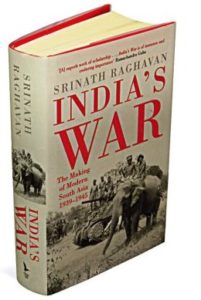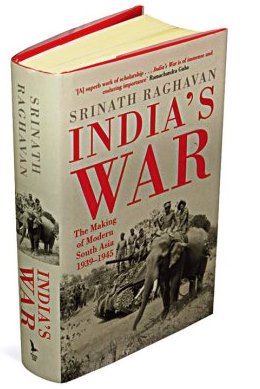Historian Srinath Raghavan in his latest book, India’s War: The Making of Modern South Asia, 1939-1945 (Allen Lane), details India’s contribution to World War II. The book explores the war’s impact on the Independence movement, how it was during this period that the Army saw its biggest expansion, and why this inquiry is important from a military history point of view.
In a camp in Nazi Germany in early 1943, an Indian prisoner of war (PoW) , Labh Chand Chopra of the 2nd Royal Lancers was approached by recruiters for Subhas Chandra Bose’s Free Indian Legion. 22-year-old Chopra found himself torn by a clash of loyalties. As Srinath Raghavan explains in his new book, “The decision to disavow the Indian army was not an easy one for the volunteers. This was especially true of men from the martial classes whose allegiances had been tied to the Raj by long-running family traditions of military service, by generous schemes of welfare and pension, and by an abstract sense of loyalty to the king emperor”.
Even after a year of fervent appeals led by Bose, by early 1943, just over 2,000 of the 15,000 Indian PoWs held by the Axis forces actually volunteered for Bose’s anti-British force (and even here recruitment rates picked up only after recruiters began to work along caste and creed lines, sending Muslims to draw Muslims, Gurkhas to draw Gurkhas, and so on).
Raghavan’s book “India’s War—The Making of Modern South Asia, 1939-1945” [Allen Lane, 554 pages, INR 699] , recounts the stories of hundreds of Indian soldiers during the second world war.
Chopra later said in a letter that he was forced to lock himself in a room for 24 hours, “discussing with myself the pros and cons of breaking my oath to the King of England. It was indeed a very difficult task to decide, but inner sentimental, emotional and patriotic feelings prevailed and I finally chose the uniform of the Indian Legion”.
Chopra’s inner conflict is, in many ways, symbolic of the awkwardness that India continues to show when it deals with the history of its participation in the two world wars.
Hundreds of thousands of Indian soldiers fought both wars and tens of thousands of them died in the course of the most vicious fighting in the most perilous conditions. Yes, they were Indian soldiers but were they fighting for the British empire or the vanquishing of fascism? Or both?
Raghavan was a soldier himself and his fluency with military matters shines through. And his observation of “civilian matters” is sharp and direct.
Raghavan’s book does not go into the tiresome matters of what is Indian history, who should tell it and the “politics” of historical narrative. Instead, Raghavan tells the story of India’s second war through five intertwining strands of narratives: the strategic, the military, the domestic, the international, and the socio-economic.
Each one of these strands is full of incident and individuals and implications and most bewildering interconnections, says Sidin Vadukut ,one reviewer who feels Raghavan tells a wholly satisfying story. There is a dispassionate, nationality-agnostic quality to Raghavan’s writing that only helps to make this book doubly enjoyable.
Towards the end, Raghavan tries to assess the long-term impact of the war. He writes that “…during Partition, the districts that had higher numbers of men with combat experience saw significantly higher levels of ethnic cleansing”.
For both India and Pakistan, Raghavan explains, “this was a history that neither country wanted much to recall. The nation-states of India and Pakistan needed new histories for self-legitmization. And so they sought to gloss over the war years of common mobilization and sacrifice.”
In an interview Raghavan said,
I think it was clear even at the time that World War II would change the world forever… I think the key point is that the British lost the empire not just because they were weakened by the war, but because they lost the Indian Army’s support by the end of it, which was their instrument of control. That’s what the impact of the INA mutiny was, to show that the British could raise this massive Army, but that it could turn on them too. People like Churchill had even questioned the expansion of the Indian Army and said: “Someday it is going to shoot us in the back”.
[Book Review by Debashish]


